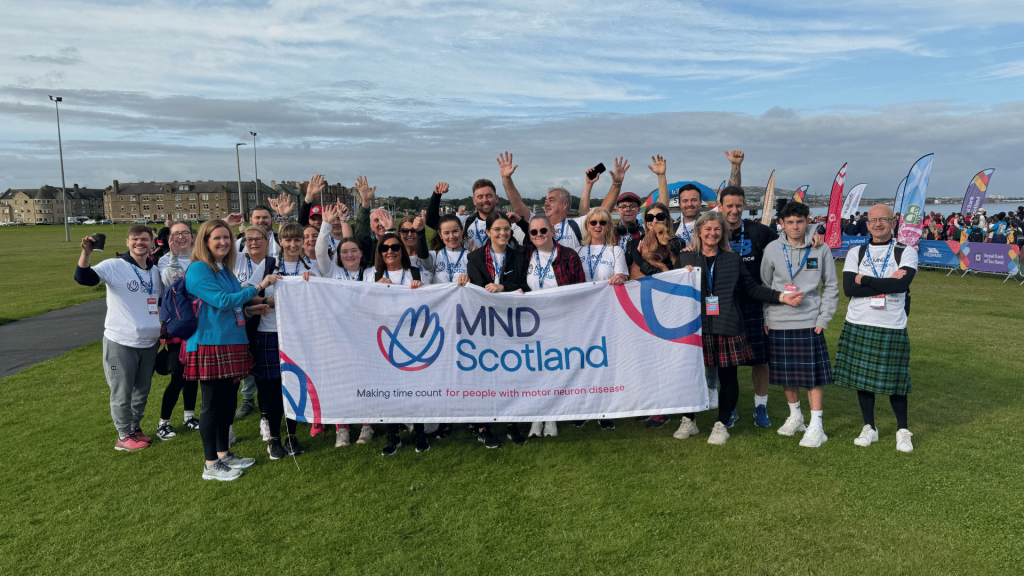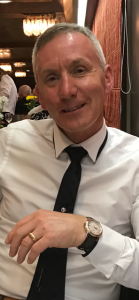What is MND
Find support
I have MND
I am supporting someone
Get involved
Research
About MND Scotland

Marie Millar, 59, from Cumbernauld, recently took part in the Edinburgh Kiltwalk Big Stroll on 15 September. She was joined by 29 friends and family members who all helped to raise important funds and awareness for MND. So far, a total of £16,000 has been raised which will allow MND Scotland to fund important research and continue to make time count for families affected by motor neuron disease.

The couple lived together in Glasgow for two years, before finally settling in Cumbernauld where they started a family together; they have a son, Ian (35), a daughter, Zoe (28) and a granddaughter, Eva (7).
Ian worked as a taxi driver for 35 years. Marie owns a Beauty Salon – located directly next to her house – allowing her to work from home while caring for Ian following his MND diagnosis.
Speaking about Ian’s MND diagnosis, Marie said: “Ian always kept very fit and in good shape. He was always going to the gym. He noticed something had changed one day after coming home as, instead of doing 30 sit-ups like he normally would as part of his gym routine, he could only do 10 and said he just physically couldn’t do any more than that”.
Despite being the same weight for most of his life, the family noticed Ian was starting to lose weight but thought it was due to him not eating enough. Ian began to experience other symptoms and felt as though his leg didn’t ‘belong’ to him. His balance was off, and he had several falls. Marie prompted Ian to go for blood tests to find out the cause, but everything came back clear.
Marie added: “We both had COVID in the run-up to Christmas 2022, and he was quite unwell after New Year. He was admitted to hospital and given oxygen as he had suspected pneumonia. After various tests, they said he had a problem with his heart and noticed his left leg was a lot thinner than the other one. They wanted him to see a neurologist.”
Scan results showed a weakness in his brain, both arms and legs. Ian’s MND diagnosis was conclusive, and the couple’s lives changed forever after being told he had motor neuron disease in February 2023.
“I couldn’t stop crying. I was in complete shock and disbelief. Ian kept so calm about it. He drove us home after receiving the news and I cried the whole way back. On reflection, all the issues he had in relation to carpal tunnel and shoulder problems could all be related to MND”, Marie said.
MND affects every individual differently. You may not develop all the symptoms, and symptoms may progress at a different rate to someone else with MND. Life expectancy can also vary, depending on the type of MND you have and the way it affects you.
Ian’s illness progressed quickly from him not being able to walk very far, to being confined to a wheelchair. His voice started to change, he was choking a lot, and he was having issues with breathing. He was unable to do many of the things he used to do.
He was fitted with a non-invasive mask and he started using it most days. Eva, the couple’s granddaughter, accepted Ian’s condition and started to help with his mask when it fell off or loosened. The whole family desperately tried everything they could to help Ian. His brothers, sisters and family all rallied around him after hearing about his diagnosis.
Marie added: “I tried to find out everything I could about MND. I made sure he had everything he needed in advance of his symptoms developing – for example we ordered a wheelchair which took three months to arrive. By the time we got it, he really needed it at that point. My son was determined to cure his dad. Our daughter is a carer, so she was more realistic and aware of what to expect following an MND diagnosis”.
Marie describes Ian as being easy-going and taking everything in his stride – remaining strong throughout his diagnosis. He never complained the whole time during his illness. Supported by MND Scotland, the family were kept informed about what support was available to them and what resources they could access.
Despite not being ‘tech-savvy’, Ian would play on his tablet for hours to keep himself entertained. He lost power in his right arm and struggled with his left. When it began to weaken, he tried eye gaze technology to help write messages, however, he struggled with the supportive aids.
After repeated bouts of aspirated pneumonia, Ian decided that he wanted to go into a hospice to have the mask removed under sedation and die – a decision Marie felt was very brave of him to make. However, he died before his mask could be removed. By that point, he was unable to eat or drink, and the only way he could communicate was by pointing to an alphabet board.
Marie said: “The weekend before he went into the hospice, he asked for his elderly mother, who was 95 at the time, to visit him. Despite being unable to do anything for himself unaided at this point, he asked the carers to shower him, dressed him in a shirt, and they sat him upright on a living room chair. When his mother came into the house, she went straight up to him, and they held each other’s hands as they both knew it would be the last time they would see each other.”
Ian bravely lost his battle with MND in June 2024. He made the brave decision to donate his brain and spinal cord for research.
Despite receiving triple bypass surgery the previous year, the couple’s best man, and Iain’s good friend, Stef, decided to take part in the Kiltwalk with his wife three weeks after Ian died to show their support to the family.
Once friends and family all heard about the challenge, 29 people signed up and agreed to take part and walk with Marie in Ian’s memory. Together, they have raised over an outstanding £16,200 in donations.
Jonathan Mitchell, Head of Fundraising for MND Scotland, said: “Fundraising in memory of a loved one is such a special thing to do, especially during such a heartbreaking time. My sincere thanks and condolences go out to everyone who laced up their shoes in memory of Ian. Sadly, Ian’s story isn’t unique and many families across Scotland are facing similar struggles. We rely on fundraised income to make sure we can continue to make time count for those affected by motor neuron disease.”
Thanking supporters, Marie said: “I’d like to thank everyone who took part on the day and everyone who supported me, either through online or cash donations. A special thanks to Joe and Marie for their constant support throughout Ian’s illness, and to David and Shelley – even though David had his own serious health issues that year, he never forgot his friend. Thank you, everyone.”
MND Scotland would like to say thank you to Marie and everyone who joined her on the day to help raise vital funds which will contribute to finding a cure for MND and help to make time count for families affected by motor neuron disease.
Registration for Kiltwalk 2025 is now open. If you would like to sign up and help make time count for families affected by motor neuron disease by walking for MND Scotland, please visit: https://thekiltwalk.co.uk/.
For more information about MND Scotland and how we can support you or your family, please visit: www.mndscotland.org.uk, email: info@mndscotland.org.uk or call: 0141 332 3903.
Sign up
for newsletter
Get the latest news and events straight to your inbox.
You can help create a world without MND